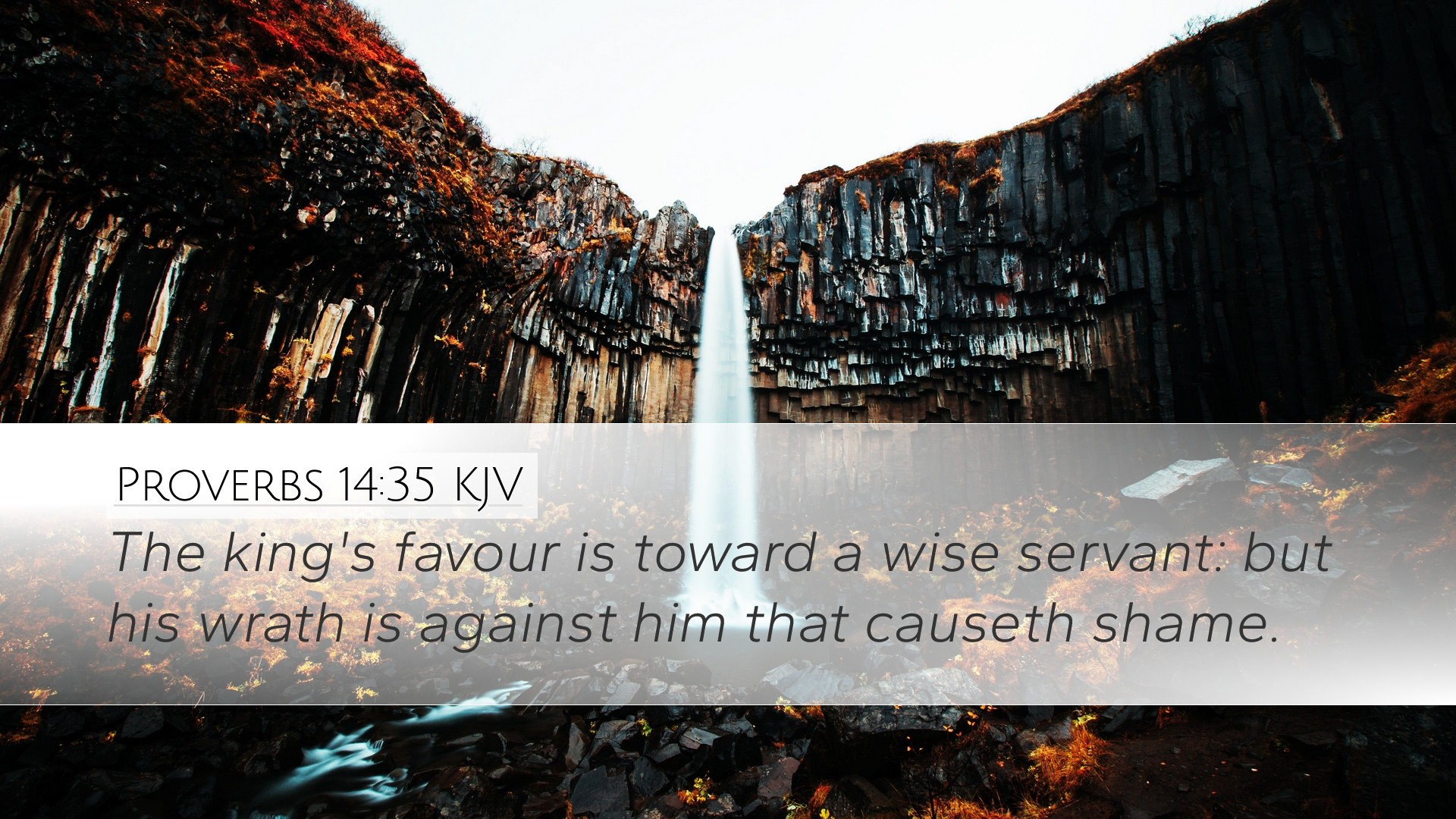Proverbs 14:35 - Commentary Summary
Verse Text: "The king's favor is toward a wise servant: but his wrath is against him that causeth shame." (Proverbs 14:35, KJV)
Introduction
The Book of Proverbs is a collection of wise sayings and observations about life, human behavior, and godly wisdom. Proverbs 14:35 presents a profound insight into the importance of wisdom in the eyes of authority, particularly in the context of a king and his servants. This commentary seeks to explore various aspects of this verse as interpreted by esteemed scholars such as Matthew Henry, Albert Barnes, and Adam Clarke.
Commentary Overview
1. The Nature of the King's Favor
Matthew Henry emphasizes that the king's favor is a form of approval, which can lead to prosperity for a wise servant. Wisdom in this context is not merely intellectual acumen but includes discernment, integrity, and the ability to navigate the complexities of royal court life. Henry notes that a wise servant is one who understands the king's expectations and works diligently to meet them.
Albert Barnes elaborates on the implications of "favor" in a socio-political sense. In ancient times, a king's support was crucial for success and survival, and those who were favored could rise in status and influence. He highlights how wise servants who demonstrate skill and loyalty win favor, resulting in tangible benefits. Conversely, such favor may also reflect the king’s interest in justice and skillful governance.
2. The Consequences of Causing Shame
Henry notes that the verse contrasts wisdom with the consequences of folly, specifically mentioning "him that causeth shame." Servants who act foolishly or dishonestly not only risk losing their positions but also bring disgrace upon themselves and their king. This serves as a warning against behaviors that could lead to negative repercussions, both personally and publicly. The idea is that causing shame is a significant offense in any royal court and can lead to the loss of favor and even severe punishment.
Adam Clarke provides additional insights on the notion of shame. He argues that causing shame reflects poorly on the king’s judgment in appointing his servants, thereby affecting the entire kingdom’s reputation. He emphasizes that wise leadership entails establishing a court filled with honorable individuals, as the character of a king's servants often reflects on him.
3. The Application of Wisdom in Leadership
The verse implicitly advises rulers and leaders on the type of individuals they should promote within their administration. Barnes highlights this point, asserting that it is prudent for rulers to recognize the value of wise counsel and surround themselves with capable individuals who will enhance their reign.
Furthermore, Henry asserts that leaders should seek wisdom not only for themselves but encourage it among their subordinates. It underscores the significance of fostering an environment where wisdom is celebrated, ensuring that the affairs of state are managed effectively and justly.
4. Broader Life Lessons
This verse has applications beyond political realms, extending to personal relationships and everyday interactions. It serves as a reminder that wisdom is essential for building connections and nurturing favorable relationships, whether in the workplace, family, or community.
Clarke emphasizes that everyone, regardless of position, can gain from the underlying idea of this proverb. Wise actions lead to honor and privilege while foolish or shameful behaviors can result in disgrace and loss. The principles of wisdom and folly are universally applicable, encouraging individuals to strive for a wise character in all their dealings.
Conclusion
Proverbs 14:35 delivers a critical lesson in the dynamics of authority and the essence of wisdom in leadership. Through the insights of Matthew Henry, Albert Barnes, and Adam Clarke, we gather that the favor of a leader often hinges on the wisdom and integrity demonstrated by their servants. The verse serves as an enduring reminder of the virtues of wise counsel and the consequences of folly, providing valuable lessons for pastors, students, theologians, and scholars alike.


